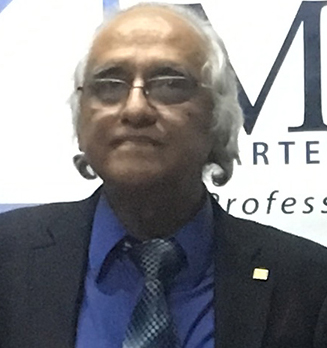A government ad seeking consultancy services for auditing cost recovery expenses submitted by ExxonMobil has been criticised as “shoddy” and concern expressed that the “deficient” scope of the audit could see Guyana losing millions of dollars.
“It is elementary that if the Terms of Reference or the scope of the engagement are deficient, then the work will be deficient and the objectives not met. With these Terms of Reference as poor as they are, Guyanese must sadly and inevitably brace themselves for the oversight and regulation of the sector to be as bad, if not worse, than (Minister of Natural Resources Raphael) Trotman’s negotiation of the Petroleum Agreement,” accountant Christopher Ram wrote in his Friday column in the Stabroek News.
The ad, placed by the Ministry of Natural Resources, seeks expressions of interest from consultancy firms to conduct an audit of the recoverable contract costs submitted by ExxonMobil and provide on-the-job training to Guyana Revenue Authority (GRA) and Audit Office of Guyana (OAG) staff on cost recovery auditing. The activity falls under the World Bank-sponsored Guyana Oil and Gas Capacity Building Project.

According to Ram, the “conceptually and constructionally flawed advertisement and proposed engagement” excludes some of the most fundamental issues that an audit of this nature should address.
President David Granger’s former Petroleum Advisor Jan Mangal has also expressed concern and warned that Guyana could lose millions of dollars.
“Again, the Guyanese authorities are missing the point and have not yet grasped the issue. The rigorous review and subsequent negotiation of both scope and cost by the client (Government) is an essential part of Production Sharing Contracts. If this is not done then the country could forfeit hundreds of millions of US$ for no reason. Yesterday’s ad is for an accounting or compliance type exercise. But that is not what is required,” he wrote in a post on his Facebook page.
“A proper review requires knowledge and benchmarking data of the oil & gas industry and market place, of historical and recent cost of services and assets, of appropriate technical solutions for design, fabrication and installation, etc., etc. How else do we verify that the contractors and subcontractors scope/ costs (Exxon, Sbm Offshore, Technip, etc.) are reasonable. The reference to “value for money” in the ad is a telling sign of the scant level of knowledge by the authorities,” he added.
“We are already forfeiting about US$2.6 billon to Exxon just for the first project, i.e. Liza Phase 1, because of the unfair and weak contract. Why forfeit even more via a shoddy cost recovery exercise?” he questioned.
Amateurish
Meantime, Ram criticised the ad and proposed engagement as “uninformed, amateurish and short of knowledge and understanding of what an audit of a contractual arrangement is and how it is carried out.” He raised the issue of the constitutional nature of the OAG and the statutory powers, functions and duties of the GRA, while pointing too to provisions of the Petroleum Agreements issued under the Petroleum Exploration and Production Act.
“The advertisement assumes that there is no difference between pre-contract costs or how these are to be dealt with, pre-production costs, and post-production costs. Nor does it give any hint of the audit which the GRA has announced it is carrying out,” he observed.
Last month, Stabroek News reported that the GRA had begun auditing the US$460 million pre-contract and cost recovery charges submitted by ExxonMobil. The audit of the pre-contract costs is occurring against the backdrop of questions about whether the GRA has the capacity to be undertaking the process and whether the government has formally delegated authority to it for this purpose. Questions have also been raised about why the OAG is not involved.
According to the ad, the consultant will work with a designated joint GRA/OAG team to audit, examine and verify all available documentation and records necessary for charges and credits relating to the contractor’s activities under the Petroleum Sharing Agreement. These include all books of accounts, accounting entries, material records and inventories, vouchers, payrolls, invoices and any other documents, correspondence. The team will also determine if any required documents are yet to be submitted.
The consultant is also required to examine the contract costs submitted by the contractor to determine if these costs have been properly assigned to the correct cost category, in the correct amount and with adequate transparency level. The consultant is expected to determine if the contract costs are eligible for cost recovery (including determining the fiscal year of incurred expenses and consequences for potential future uplift); and if, in the opinion of the consultant, costs submitted by the contractor have been incorrectly categorised and/or should be disqualified from cost recovery.
Further, the consultant is expected to assist the relevant authorities in communicating the findings of the audit to the contractor and, if requested, represent or accompany the relevant authorities in meetings with the contractor. The consultant would also have to assess the impact of the audit on future Profit Oil and Profit Gas, its subsequent petroleum tax implications and if relevant tax entitlements are optimised in the interest of the Government of Guyana.
According to the ad, the consultant will also be required to provide on-the-job training to the GRA and OAG staff as they work jointly with the consultant as well as other agencies aimed at building the capacity of these agencies to understand the methodology applied in conducting the audit, interpret the findings of the audit, communicate findings to the contractor and manage future audits.
The duration of this assignment is expected to be four months, with an option to renew on expiration, commencing December 2018.










